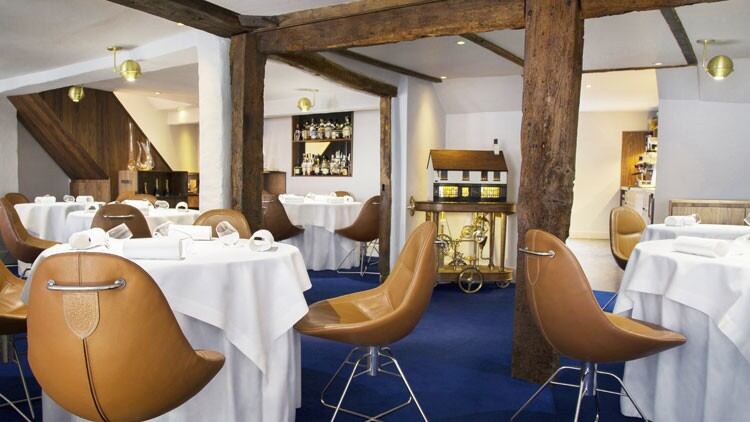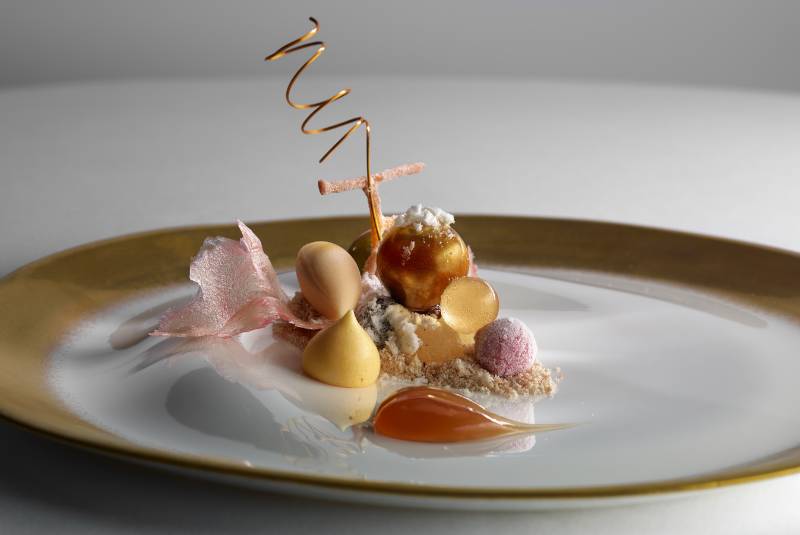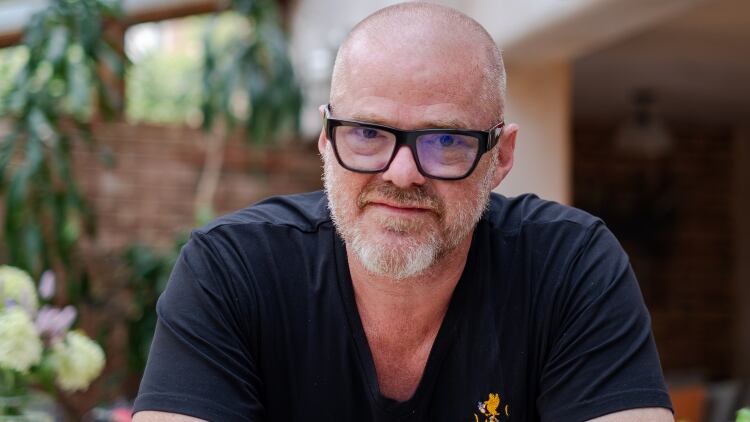In the captivating BBC programme Heston: My Life with Bipolar, Heston Blumenthal addresses how having the mental health condition, which is characterised by periods of elation known as mania as well as intense depression, might have boosted his creativity as a chef and the impact that medication he now takes to curb such extremes in emotions might have on it. “Are you at all worried that you might not get that creativity back,” the interviewer asks him in the documentary, to which Blumenthal replies sombrely: “Yes I am.”
It’s a question of deep significance for a chef for whom creativity has not just become a trademark but also the very fibre of his being. From snail porridge, bacon and egg ice cream, and nitro-poached aperitifs made using liquid nitrogen, a process to which he would become inextricably linked, to floating pillows, dissolving gold fob watches, and even eating a meal in reverse, the life of Blumenthal’s three-star restaurant The Fat Duck has centred on the whacky and the wonderful and has given the chef a boffin-like persona. Was he in a manic phase when such culinary wizardry occurred, he asks of himself in the programme. And if so, what happens now?
The answer, as it turns out, is Pinot Noir Grape, Blumenthal’s latest creation that is so complex that he and his team have described it as the most complicated dessert in the restaurant’s 30-year history. Containing at least 20 elements and more than 50 stages in its preparation - including a ‘soil’ made with dark chocolate, truffle, rose, parmesan, vanilla salt and cocoa nibs, and churros dusted with cep mushroom powder - the dish is a follow up to Blumenthal’s 2012 dish Botrytis Cinerea, which recreated the flavour of Château d’Yquem, and other sweet wines produced using grapes affected by noble rot.
This time, Blumenthal and his team is taking on red wine, specifically those made by world famous Burgundy estate Domaine de la Romanée-Conti. If there was any question as to whether the medication might dampen his imagination, ambition and inventiveness, Blumenthal has served the answer up on a plate.

Thirty years and counting
I’m speaking with Blumenthal via video call from his home in the south of France, where he moved in 2018. I’m one of a number of journalists to whom he’s speaking over the next few hours to talk about the new dish but also to reflect on 30 years of The Fat Duck - a remarkable milestone - and yet he’s enthusiastic and engaging as if he hasn’t already had the same conversation with someone else moments before. He lists with passion the mind-boggling ingredients and processes that have gone into the dish, and while his speech is now slower and more measured because of the medication he is on, his eyes betray his keenness of mind.
The dish is like a train, and the train is ready to go on the track, which is the menu, and as it is travelling you tweak and change. I call it restless perfectionism
Six months in development, Blumenthal describes with clarity the challenges of trying to recreate one of the world’s most famous wines in dessert form. This included homing in on the different flavour characteristics of the wine, such as tobacco, and then continued trailing of quantities and preparation until the right notes were hit. Add to this the fact that, because of the high price tag of the wine the team had to find a similar, but far less expensive, Burgundy with which to conduct their tastings, and it is little wonder that he describes its creation as “a ball breaker”. “It’s one of the most complex dishes we’ve ever done, without a shadow of a doubt,” he adds, “with the most ingredients of any dish we’ve done.”
A pressurised environment
Pinot Noir Grape might be a feat of brilliance, but it is just one of a long list of envelope-pushing dishes that has made Blumenthal one of the world’s most famous and revered chefs. It is impressive how he has managed to continue in such a vein of creativity across three decades, with a career that has seen The Fat Duck crowned the World’s Best Restaurant, included numerous TV series and the development of ever more innovative dishes for Waitrose. But at what cost?
“It has been brutal,” says Blumenthal, reflecting on the past, the standards he set himself and the almost constant pressure to produce something more show stopping than the last. “If The Fat Duck was a more traditional Michelin-starred restaurant what happens is you change duck for pigeon, and celeriac for turnips. The dishes at The Fat Duck are all unique and it’s been really hard developing them. Most dishes take months to develop.”
I felt it really deeply that I had to come up with brand new dishes all the time
Some even longer. Blumenthal’s famous dish Sound of the Sea, where diners hear sounds of the seashore through headphones, took three years to perfect. The original Botrytis Cinerea dish had another long gestation. His Counting Sheep dish, where a lullaby is played, a pillow ‘floats’ and edible baby powder features, brought with it numerous challenges in the development process. Sometimes the effort doesn’t even amount to anything. Blumenthal spent four years trying to make savoury candy floss, consulting Tate & Lyle in the UK and confectionary companies in Switzerland in the process, before realising it couldn’t be done.
“I had created a monster and was hanging onto its tail. It was an incredibly hard period,” he recalls of the more challenging periods of his time at the restaurant. I felt it really deeply that I had to come up with brand new dishes all the time. That was a hard thing to do.”
The pressure eventually became a contributing factor in Blumenthal stepping away from the restaurant and moving to France. It was here in 2023 that he was sectioned following a particularly bad episode of mania, spending 20 days on a psychiatric ward and another 40 days at a clinic. This later led to his bipolar diagnosis and the course of medication that includes anti-depressants, sleeping tablets, and pills to moderate dopamine and serotonin, about which he speaks frankly in the BBC documentary.

Return to The Duck
Since then, it has been something of a journey of self discovery for Blumenthal as he has learnt to accept and cope with his bipolar. He has since become an official ambassador for the charity Bipolar UK and has returned to the kitchen. These days Blumenthal is once again a regular face at The Fat Duck. He makes the trip across the channel at least once a week, often more, and while you won’t see him running the pass his creative genius is once again in full flow. “I’ve spent more time in The Fat Duck in the past couple of years than I have done in a long time,” he says.
While at the restaurant he conducts two or three tastings of existing dishes, looking at how they can be improved. His return to the kitchen has also heralded the introduction of an a la carte menu that features some of the restaurant’s most famous dishes to celebrate its 30th birthday and also the return of its ‘most iconic’ dishes, such as the aforementioned nitro-poached aperitif; aerated beetroot; breakfast in a bowl; crab ice cream; jelly of quail; bread and butter; and beef royale.
The return of such dishes could be interpreted as Blumenthal taking the easy option, but this couldn’t be further from the truth, he insists. Every dish might have the same name, but they have been painstakingly taken apart and improved for the restaurant’s next generation of diners.
The worst question someone can ask me is ‘what’s next?’. I’m going to have a sip of coffee, that’s what’s next
He cites Greek philosopher Heraclitus’ famous quote that ‘no man ever steps in the same river twice, for it is not the same river and he is not the same man’ as a source of inspiration. “When we wrote The Fat Duck Cookbook the recipes were so precise it was even down to the size of the pan, so it was exactly as we did it at the restaurant. But I tasted them, and they were not as good as I remembered. I realised that we change so much. It’s like listening to a piece of music or watching a film - you appreciate it very differently 10 years later.
“What we’ve done with the a la carte is effectively create new dishes. The names might be similar, but they are very different in their taste and flavour. The dish is like a train, and the train is ready to go on the track, which is the menu, and as it is travelling you tweak and change. It is very hard, but it has been a good exercise. I call it restless perfectionism.”
Aiding him in his endeavours is Jocky Petrie, a driving force behind The Fat Duck for more than a decade before leaving in 2013 to later join The Ledbury and then Gordon Ramsay Restaurants. Petrie’s return is an important stage in the restaurant’s lifespan and in helping with its evolution and having someone with as almost an intimate knowledge of much of the menu as Blumenthal himself has proved invaluable.
“It is great to have him back,” says Blumenthal of the reappointment. “He’d been gone for 10 years maybe, and when he and I were going through the tastings he was a bit perplexed because I’ve lived with the evolution of those dishes, but he’s had a break from them.”
How did he react to Blumenthal’s desire to change things? “Let’s just say his notepad was very full,” he responds with a smile.
Given that he’s delving back into previous dishes, some of which were created before some current guests of The Fat Duck were even born, is there a particular one of which he most proud or fond?
“I don’t have a dish I’m most proud of,” he says. “It may sound a bit big headed but I’m proud of all of them. Some dishes have put a flag in the sand and have had a major impact on world gastronomy.”
One is the crab risotto, which first appeared on the menu around 1998, and which featured a crab ice cream served alongside hot risotto. The dish evolved from salmon ice cream, which was the subject of the first university paper Blumenthal co-wrote, discovering that if he called it smoked salmon ice cream it was deemed to be 10-20% saltier by tasters than if it was called smoked salmon parfait.
“If you’re told something is ice cream you expect it to be sweet so when you get salt there’s a big difference in expectations.” It is this lightbulb moment decades ago that would prove so formative in his approach to cooking thereafter.
A more recent enlightenment occurred around 18 months ago when Blumenthal was minded to look up the word ‘gastronomy’. “For years I had a thing about molecular gastronomy, but it took me 28 years to look up its definition. I always thought gastronomy was all to do with posh restaurants but it’s the sourcing, preparing and eating good food. With molecular gastronomy you just zoom into things more. What I’ve done is created a multi-sensory gastronomy. But a prawn sandwich can be gastronomic.”

A thinner future for The Fat Duck?
It’s clear from talking with Blumenthal that, despite all that he has been through in the past few years, his mind remains inquisitive. I ask him what the future holds, to which his response is light-hearted: “The worst question someone can ask me is ‘what’s next?’. I’m going to have a sip of coffee, that’s what’s next.”
Of course, there’s also a proper answer. He says that The Fat Duck could soon offer smaller portion sizes due to the growing number of diners on weight loss drugs such as Mounjaro and Ozempic (the restaurant has since introduced a scaled-down version of its tasting menu called the Mindful Experience).
Blumenthal, who has himself been using Mounjaro for the past year to try and shift some of the weight his bipolar medication has caused him to gain, believes that such weight-loss jabs pose an increasing threat to restaurants, and that even restaurants of high ambition such as The Fat Duck are not immune.
I don’t have a dish I’m most proud of. It may sound a bit big headed but I’m proud of all of them
“We are going to look at reducing portion sizes and give options of a much smaller menu because with these weight loss drugs, Mounjaro, Ozempic, and Wegovy people are eating less and the quantities of food will put them off,” he says. “I want to do something about that.”
He has also recently taken a serious interest in gut health. “So much research has been done on how what we eat effects our mood but there’s hardly any research on what our mood does to the way we digest our food. If you eat when you’re angry, or happy, or laughing or in love, or sad, or frustrated it has a different effect on your gastric system.
“Most of your hormones exist in your gut, although they come from the brain. We’ve got more bacteria in our bodies than stars in the universe. It’s mad and it’s something I want to learn more about.”
It’s something I want to hear more about, too, but just then he realises he’s already late for his next video call and promptly but courteously disappears from the screen, no doubt to explain everything all over again.


